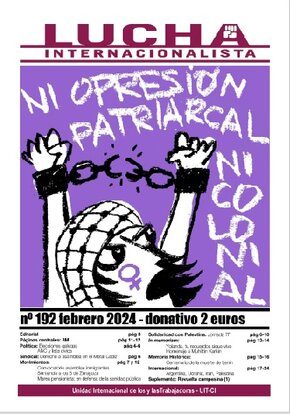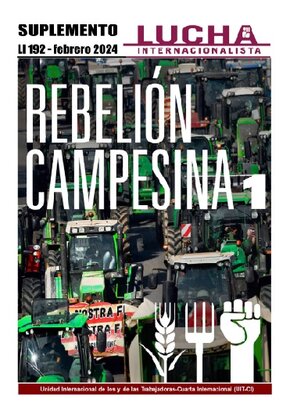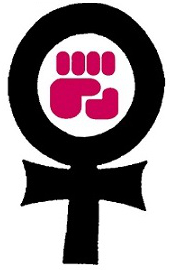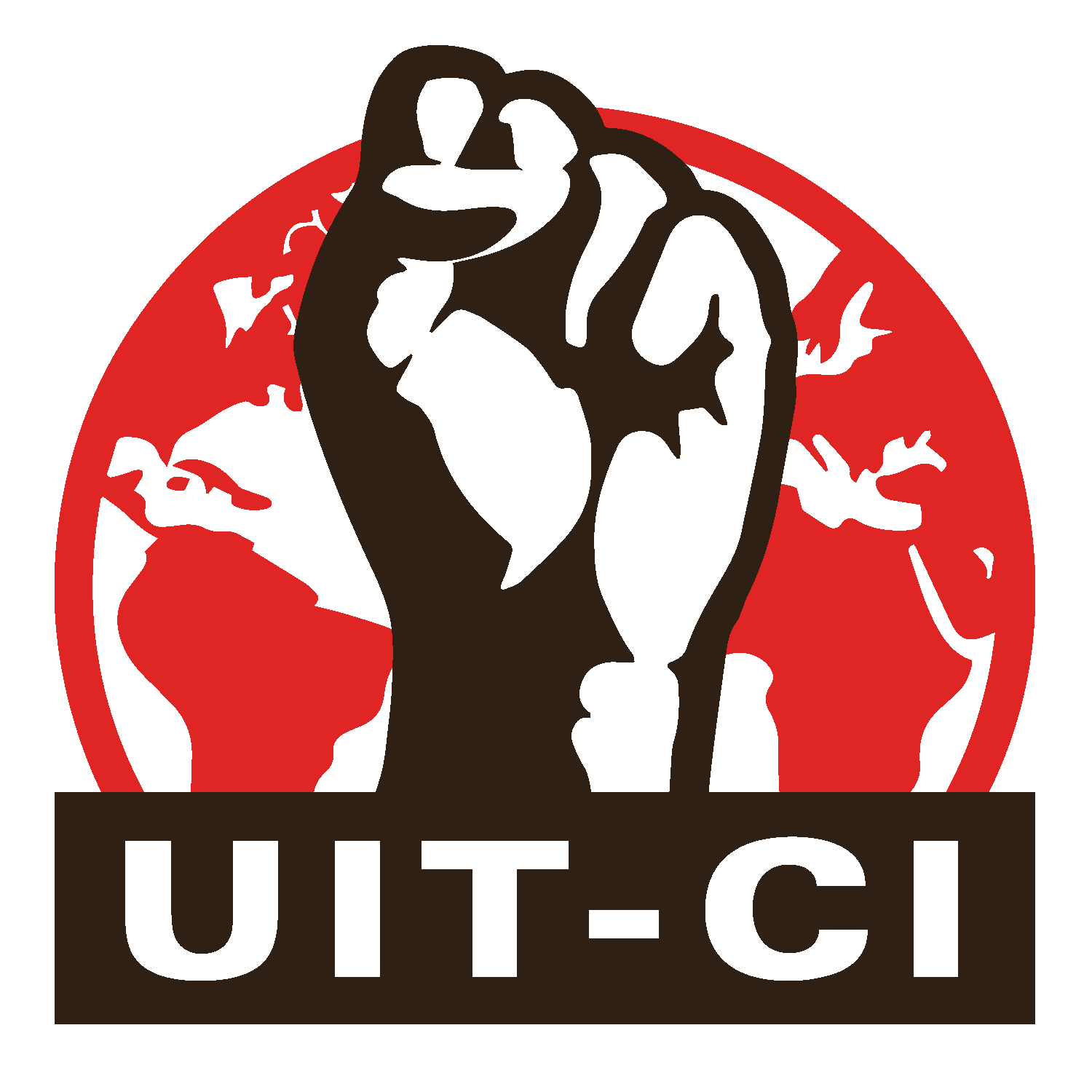
Artículos de actualidad de la UIT-CI

Artículos de actualidad sobre Ucrania
NI VIOLENCIA PATRIARCAL, NI OPRESIÓN COLONIAL. LAS TRABAJADORAS CON LA RESISTENCIA PALESTINA.
Estás aqui : Portada » Actividades y Campañas » UIT-CI » Otros Idiomas
Document of ILC
Perspectives on the revolutions of Northern Africa and Middle East
ILC, 4 November 2012
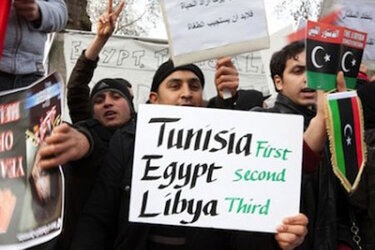
1. The uprising began after the self-immolation of Mohammed Bouazizi by letting himself on fire in the 17th of december which set off a wave of protests all around the Arab countries. These protests evolved into revolutions in Tunisia and in a short run the revolution spread to countries like Egypt, Morocco, Bahrain, Yemen, Libya and lastly Syria. The deepening of unemployment and poverty triggered the massive demonstrations. The masses which are fed up with the repressive apparatus of the regime and the imperialist exploitation took the scene with the slogan “Down with the dictators!”. These revolutions not only changed the political stability in the North Africa and the Middle East but also opened a new epoch in the worldwide political situation.
2. The overthrowing of the dictatorships which were in engagement with imperialism and Zionism influenced the class struggle on a worldwide basis. The “indignados” movement in Europe, the “Occupy Wall Street” protests in US are all movements that sprang up taking the struggle of the Arab peoples as their example. On the other hand; in the region the process offered a new dynamic to the struggle of the Palestinian peoples. The appeal of Palestine to UN for independence, the reunion of Hamas and the PLO (Palestine Liberation Organization) or the occupation of the Israel Embassy in Cairo by the Egyptian protesters in the same day with Gaddafi’s flight from Tripoli were the reflections of this dynamic.
3. The revolutions have also provoked the debate whether this process could be called a revolution or not, among those who define themselves in the ranks of the left. This confusion later on lead to political inconstistencies. The social democracy and the institutional socialist parties supported the Bonapartist regimes with a clear counterrevolutionary position, together with their own bourgeoisie and Imperialism. Then when they found out that these regimes could no longer survive the rebellion; they chose to align themselves with the opposition and they sought for taking the revolution and the alternative leaderships under control. Moreover, the government of Chavez and Castro and the nationalist leftist currents placed themselves against the rebellious masses and supported military-police regimes of Gaddafi in Libya and Assad in Syria claiming that the revolutions are merely imperialist conspiracies. This position seriously impeded the international solidarity with the Arab masses.
4. The overthrowing of the authoritarian, military-police regimes that repressed the Arab masses for years marked a turning point for the region and for the progress of the world revolution. Arab revolutions began as a result of the independent initiative of the masses without any intervention or influence of the nationalist or Islamist leaderships. The lack of an organized leadership defined the spontaneous nature of these revolutions. The spontaneity is the same character that makes these revolutions powerful but negatively it constrains the scope of the revolutions. In Tunisia and Egypt despite the beheading of the dictators, the institutions of the old regime are still permanent. This means that the revolutions failed to achieve its political objectives, hence they are incomplete revolutions. Overall; the spontaneous mobilization of the masses under democratic demands to break with the established system, the formation of self defense organs which carry the potential of dual power and the growing objective political conditions for a worker-proletarian government makes us characterize the current phase of Arab revolutions as unfinished democratic revolutions.
5. The violent slaughter of the dictators against the mass mobilizations in Libya, Yemen, Bahrain and Syria launched a new stage in the Arab Revolutions. The imperialism that intervened Libya is avoiding to repeat another adventure in other countries but it is developing the tactics for giving a halt to the revolutions and taking them under its control. These have been the reasons that compelled imperialism to impose different tactics: the criticism it received from the intervention in Libya and the chaos that it created, the pressure of the world economic crisis, the difficulty of a military intervention, Syria’s strategic position which it could not take the risk of destabilizing Israel. Sending military troops to Bahrain through Saudi Arabia or the use of drones in Yemen or seeking agreements between the opposition and the regime in Syria and Yemen have been the new tactics it applied for hindering the revolution. Instead of supporting the remains of the collapsed regimes, imperialism choose to collaborate with the “new” Islamist leaderships that haven’t joined the process of revolution. However we know that these Islamic tendencies could never satisfy the demands of the masses while acting with imperialist interests. Even the effort of satisfying the needs of the masses would be a mortal effort for their own existence because the plundering of the Arab countries by the multi-national corporations with the Islamic tendencies would not be as easy as it used to be.
6. Until the 80’s the policy of the Arab nationalists have been distancing themselves geostrategically with imperialism and developing closer ties with USSR on military and diplomatic level. This was the popular policy that gave them mass support. Even they had close relations with USSR, they maintained their position in the capitalist world system and preserved bourgeois forms of property and production. On the other hand the regimes had a Bonapartist character serving the state bureaucracy and the comprador bourgeoisie while violently repressing the masses.
7. At the second half of the 1970’s when global capitalism fell into a new crisis in which a new attack which was called neoliberalism began, and the Stalinism was to collapsing starting from the USSR and spreading to every other worker state, the Arab Bonapartism was also drawn into a new crisis. The crisis initiated with the petrol crisis of 1974 where the sudden drop of oil prices dragged the economy in a deep crisis. Besides, the rising poverty and the sudden drop of purchasing power of the working class caused Arab nationalism to loose its influence and its credibility over the masses. However the Islamic tendencies took the scene and filled the political space which was empty and benefited from the discontent of the masses and in the short run acquired mass support. But the “anti-imperialist” discourse and the “democracy” that Islamic tendencies provided against the military-police regime that is dependent to Imperialism was nothing but the will of strengthening the local bourgeoisie and offering them better use of their countries own sources.
8. These conditions forced the Arab regimes to reorganize themselves politically and economically. While strengthening its relations with the imperialist countries in the global arena, within doors it reinforced its repressive apparatus and the oppressive regime. Firstly Egypt and Jordan, and then the Palestine Liberation Organization (PLO) recognized the legitimacy of the Zionist state and signed peace treaties with imperialism (1979 Camp David, Oslo 1993). Syria silently endorsed these agreements on the condition that its occupation in Lebanon was approved by Imperialism. Between 1980 and 1988 Iraq assumed the role of gendarme of imperialism with a war against Iran, which caused the death of a million people and the destruction of both countries. In 1988 Algeria established its diplomatic relations with former colonizer France, through Morocco. Since 2003 Gaddafi had the role of being the collaborator and torturer of imperialism in its "war against terrorism". All these events deepened the dependence of semi-colonized Arab states to imperialism and gave it a more direct character.
9. The significant economic transformation created by the nationalist Arab regimes consisted of liberal measures and the submission of the national sources of Arab countries to the international organizations of the Imperialism and the multi-national corporations. During the 80’s Egypt, Sudan, Morocco, Tunisia, Jordan, and in the following decade, Lebanon, Algeria and Yemen signed technical and financial agreements with IMF and the World Bank. In 2000 Libya and Syria also took steps in the same direction. Gaddafi could easily buy weapons from Spain and Germany. The family of Ben Ali, who ran Tunisia as a private company, could welcome the French ministers with private jets and luxury yachts in order to continue exporting 50 percent of the business products to European markets and offer U.S. investors extreme facilities in his country. In Morocco while the income distribution, poverty and unemployment levels reach to inhumane levels, the monarchy could spend 1,000 million dollars for the construction of the port free trade zone in Tangier. The monarchies in Jordan and Bahrain also signed free trade agreements with the U.S. In 2009 Egypt was celebrating the high note that it received by the International Finance Cooperation and the World Bank, while seemingly it was gratified that these institutions haven’t mentioned the level of unemployment, the imbalance in the distribution of income and the misery that reigned in the slums surrounding Cairo, in their reports.
Tunisia and Egypt
10. In the late 2010 the self-immolation of Mohammad Bouazizi to protest the confiscation of his vegetable cart and his goods by the police sparkled a revolution in a country where the unemployment rate reached %31 and pushed thousands of young, unemployed and poor masses against the regime. When the demonstrations took a permanent character and when the working class participated the revolt with a wave of strikes, a 24 year dictator Ben Ali was overthrown. The participation of working class even lead to ruptures in the UGTT, and many local unions broke with bureaucracy and joined the revolution actively, even being the vanguard of the protests in some areas. After the fall of the dictator, the strikes and labor struggles have continued and they have reached numbers exceeding 1,500.
11. The revolutionary process in Tunisia had its precursors in the earlier struggles of the Tunisian masses: In 1984 the "bread revolt" happened against the economic liberalization which caused misery and poverty; in 1987 the protests organized by the UGTT (General Union of Labour) were violently repressed by the regime’s forces ("Black Thursday") and in 2008, strikes and labor struggles were organized in the mining in the south and lastly in August 2010 in Ben Guerdane demonstrators protesting the closure of the border clashed with police forces. Together with these struggles, the massive layoffs in the tourism and service sectors which were effected by the economic crisis in 2008, rising food prices and increased repression lead to the objective conditions that generated the Tunisian revolution.
12. The people in Tunisia formed defense militias against the defenders of the regime in several cities. Gafsa, Kasserine, Sidi Bouzid and Tala were among the cities in which people took the city administration in their hands. When the police and those who are responsible of administration fled, the people started to organize tasks such as security, health and food distribution through people’s committees. They also formed "committees for the defense of the revolution" to ensure safety against the paramilitary forces of the regime. But furthermore the army continues to maintain its character of being the key pillar of the regime and the confidence for the army continues.
The committees have a multi-class character and they were formed spontenaously and most importantly these apparatuses have the potency of dual power. The main weakness of the committees is that it limits its tasks with merely supervising the government until the new elections and abstains from taking the power in the whole country. This attitude not only causes reactionism to rise but also restrains the mass strikes in the name of the “fulfillment” of the process of democratization. This is the worst condition to enter the elections where the imperialism already defined its allies: as a result, Ennahda won the absolute majority. However, the struggle of the workers and the popular masses continues even after the fall of Ben Ali and also with the Ennahda government which was inable to improve the living conditions of people (From the revolution onwards, 138 people protested against unemployment by setting themselves on fire). The situation shows that the social and democratic demands of the masses could only be fulfilled with the continuation of the mobilizations towards a workers’ and people’s government.
13. Ennahda, the ruling Islamist party which has been in power for 7 months with social democratic Ettakatol Party and Congress for the Republic (CPR), have made clear that there would be no jobs for the unemployed if there is no struggle for a new revolution. The unemployed rate is as it was in Ben Ali government, even it is increasing and the conditions of the workers are still worsening. Everyone agrees that they weren’t expecting such results while they were fighting against the dictatorship. But the things begin to change very quickly: the confidence of the people for Islamist Ennahda, today it is deteriorating. Although a few months ago commentators were asserting that government would restore its credibility by arresting pro-dictatorship people, today very few people believe in this claim. The most definit indicators of this situation are the strikes in Moulares or Metlaoui, Regueb or in the mining area of Redeyef, or in Tala where there have been mass demonstrations demanding the right to work. These demonstrations have found no response from the government and in some cases repressed by Islamists or police violence.
14. After the fall of Ben Ali, the role played by the UGTT leadership was terrible, entering the government of Ghannouchi, which is the continuation of the previous one and leaving it within a few hours by the pressure of union activists and Tunisian people. The apparatus of the UGTT, the former Tunisian Communist Party, which was in the government of Ben Ali, and majority of leftist groups in Tunisia were paralyzed after the emergence of the committees for defending the revolution in the early months of 2011. For these currents, the primary task was streghtening the democracy. After achieving this task, as a next step, they could start to advocate the demands of workers and the unemployed. Therefore, after the fall of the dictator, neither they intervened the wave of strikes nor they supported the demands of the mothers of the martyrs for justice. That’s why the UGTT was isolated from Tunisian people and it triggered the rise of Ennahda. Because all of that the task is today for the revolutionaries in Tunisia, putting the UGTT in the middle of the fight, for the service of workers unemployed youth and mothers of the martyrs. Today, the conversion of the UGTT is dominating the political process in Tunisia. The attempt of Islamist Ennahda for taking the control of the UGTT caused a clash between the actual leadership of the UGTT and the government. These attempts of the government was answered by the leadership of the trade union and by all of its members. In the trade union elections held in Regueb, there is only one delegate elected from the government party and the 13 other were from the left opposition. Thus, the list of government party was defeated in the elections. Also, trade union elections ended up with similar results particularly in Sidi Bouzid, Redeyef, Gafsa or Tala, where the most revolutionary and the poorest people live.
15. After the elections the government party called for a truce for three months in all struggles. In some cases, it was accepted, however in others, such as struggles for job in Redeyef, it wasn’t. Also a few days later there were strikes and working place occupations, demonstrations and hunger strikes demanding jobs in the mining area of southern Tunisia. However, the leadership of the UGTT left the struggles isolated. The UGTT has never made or coordinated solidarity campaigns in Tunisia, in some cases leading them to defeat. UGTT focussed on politics about fighting against Islam and a secular society more than anything, which seem progressive at first but turned out a bad tactic due to not related with workers’ struggles. It is clear that Ennahda Party’s goal is not only to impose an Islamic society, but also to end the revolutionary process in Tunisia, and this is the greatest betrayal of Islamists. In other words, the current policy of imperialism led by the Islamists is to create a Muslim society, while contenting the interests of the Tunisian bourgeoisie and European imperialism as well. After all, they are the guarantors of the financial interests of the European bourgeoisie. UGTT’s calls for the struggle of a secular society without any connection of unemployed workers and youth serves Islamists in Tunusia, as a country of Muslim majority. Moreover, the growing mobilization of Salafis, which is against trade unionists, workers and progressive centers, begin to threaten few gains of the democratic revolution, and it is necessary to promote organized mobilizations leading workers, people and youth in response to them.
16. We must analyze the Egyptian revolution by considering demonstrations, strikes between 2005 and 2011 and the conditions of poverty and unemployment prevailing in the country. During those years there have been over 3000 protests of workers especially in the areas of textiles, constructions, transportations and food sectors, including a strike of subway workers in Cairo. During the world food crisis in 2007, the food prices increased at the rate of 24 percent and it triggered the "bread riots". Popular protests have increased in the past four years and took on a new character with the struggle of the workers of the state-owned textiles in Mahallet el-Kubra. The Egypt revolution broke out when the masses, inspired by the Tunisian revolution, rebelled against unemployment and poverty and faced the brutal repression of the regime’s security forces. Thus, the job demands of the unemployed youth and democratic demands of the people joined in a single fight against the Bonapartist government creating a revolutionary situation that ended the Mubarak regime.
17. In the background of popular indignation against the regime, the neoliberal transformation plans that the regime launched in the second half of the 80s are taking part. For the working people, the meaning of the neoliberal agenda was unemployement, job insecurity and misery. After the implementation of the neoliberal agenda, Egypt became a country where the 40 percent of the population lives below the poverty line, more than half of the labor force works in the “informal” sector and the average salary of the workers is 80 dollars. According to the International Labour Organisation Egypt was among the 25 worst countries where workers labor rights were violated.
18. The demonstrations that began with the occupation of Tahrir Square in January 2011 were suspended when the Military council took the power. While the Military Council was holding the masses for the new elections in order to pacify the mobilizations and remain in power and this created a second wave of protests where tens of thousands of people occupied Tahrir Square again with the demands of higher wages and better working conditions. A great number of strikes broke out in the areas of public services, oil, electricity distribution and textiles. The Committees for the Defense of the Revolution began to coordinate many other local committees through a Defense Council Secretary of the Revolution. And the parlimentary elections began in the december of 2011 and ended in the february of 2012 and the Islamists (the Freedom and Justice Party supported by the Muslim Brotherhood) became the main political power of the Egyptian parliament.
However the Military Council still holds the power and insists on playing a dominant role in the formation of the new constitution and the presidential elections. This attitude of Military Council triggers the formation of new mass mobilizations against the military regime. But on the other hand, the government that took over the regime with the pressure of the masses is way too far in fulfilling the economic and political demands of the working class and it is seeking ways of bargaining with the military council.
19. In 24th of May the first presidential elections after the fall of Hosni Mubarak took place. In the first round of the elections only %51-26 million people went to vote. Mohammad Morsi, the candidate of the Muslim Brotherhood, took 24,4% of the votes and this meant a serious regression for the Islamists compared to what they got in parlimentary election, 40% of the votes. The reason of this loss of credibility lies in the colloboration of this current with the military regime in order to achieve “peaceful transformation” leading to a bourgeoisie government in accordance with neoliberal plans and the IMF. The second candidate with 23.3% of the votes has been Ahmad Shafik, the last prime minister of Hosni Mubarak and former chief of the air force. The candidate of the military regime was able to capture the votes of upper layers of the middle class whic supported the old regime, and some sectors of population that have an "insecurity situation" due to the revolution. However, the Islamist-dominated parliament banned Shafik’s candidacy because of his militaristic history. The third most voted candidate in the first round was Hamdim Sabbahi, social democratic Nasserist, won 20.3% of the votes as a candidate of the left. Sabbahi has been the most voted in some prominent cities such as Cairo and Alexandria and he defended some slogans of the revolution (work, freedoms, etc.). Later, Sabbahi and other small left liberal parties decided to boycott the second round of elections and denounced Ministry of Interior that had distributed 900,000 fake electorate cards to police officers for voting for the candidate Ahmed Shafiq. The accusation of fraud was relevant because the difference in votes between Shafiq and Sabahi was around 700,000 votes. Finally, the candidate Abol Fotouh Abeldmoneim, supported by several revolutionary groups, received 17% of the votes. On the other hand, there have been radical left currents, including the so-called "socialist internationalists" (British SWP’s fellow current), intimately called for vote for the Muslim Brotherhood as a "lesser evil".
20. On 14th of July, the Supreme Constitutional Court annulled parliamentary elections which are in November 2011 and January 2012, and enacted a law in order to validate the candidacy of Ahmad Shafik. According to the parallel voting system challenged by the Court, two-thirds of seats should be elected by party-list proportional representation system and the remaining one-third should be elected under a form of bloc voting in two-seat constituencies. Also, an election rule was amended to allow the individuals running as candidates by an agreement between the military junta and the political forces. Thus, the dissolution of parliament gave the power back in the hands of the military junta, which also holds the legislative power. Moreover, the military candidate, Shafik, conserved his position of being elected as a president. The Muslim Brotherhood, despite criticizing the decisions of the Court, decided to comply. The two sectors -military and Islamists- preferred maintaining the battle between themselves on legal ground, just like a strategy once applied in Turkey which has been supported by imperialism; they made efforts not to mobilize the Egyptian people, and keep them silent. We must pursue the reaction of the workers and the Egyptian people to end this game coordinated between the bourgeoisie and the state bureaucracy (military and civilian).
21. Today neither the Military Council nor the Muslim Brotherhood or the Ennahda governments could realize the demands of the masses which evolved into the liquidation of the institutions of the dictatorship regime and the government in Egypt and Tunisia. The economic demands over the enhancement of the wages and the working conditions could never be fulfilled by any of these powers. Mobilization of the masses tend to turn into permanent revolution, the bourgeois regimes and leaderships are looking for new regulations to save the private property. In other words, there is a constant confrontaiton between the revolution and counter-revolution. EU and U.S. imperialism in the moment, in these countries, lead the Islamist governments to impose the "Turkey Model" by emphasizing semi-Bonapartist characteristics of regime. Through such government they can easily control the ‘transition’ process on behalf of multinational corporations’ investment and to pacify mass mobilizations with the help of democratic reaction policies. The counter-strategy of these countries is to establish the bourgeois-democratic devices (multi-party parliamentary system, political and trade union freedoms of association and expression, including the Constitution, civil justice, and so on.) in collaboration with imperialism; through them again, to protect the rule of finance capital and the main pillars of the regime, also ending mass mobilization with the help of Islamist bourgeois political parties.
22. One of the dangers faced by the Tunisian and Egyptian revolutions was the sympathy of the masses into the Army. But this illusion is disappearing especially in Egypt. The masses have shown their break and outrage against the military occupying Tahrir Square again in December 2011 forcing the resignation of the interim government, while the military council ahead of the presidential election in July 2012 with the commitment to leave power after election of the new President. Moreover, the vanguard of the working class and the revolutionary currents which are aware of the necessity of a general strike for the termination of the military rule have started to prepare for it. That means that the main task of a radical break with the regime rests solely on the shoulders of the Egyptian working class.
23. The continuity of the revolutions in Egypt and Tunisia depends on mass confrontation with bourgeois governments and sustaining permanent mobilization with a revolutionary program. This program includes: nationalization of all strategic enterprises controlled by multinationals, a public plan to end unemployment, not paying the foreign debt, the confiscation of the property of former regime officials and the military and their families which have been ripping people off, trial and punishment of those responsible for the repression and state violence and the realization of the agricultural reform. The vital point of this programatic approach is the rupture with imperialism and the abolition of all its agreements with Zionism, elimination of the blockade on Gazza, and putting in life the perspective of construction of workers’ power and youth.
Syria
24. Syrian Revolution that broke out following the Egyptian and the Tunisian Revolution show similarities to Libyan, Yemeni and Bahraini processes rather than Egyptian and Tunisian ones. Lately, Syrian Revolution turned into a protracted corrosive war of attrition between Beshar Esad and the Syrian masses.
25. Factors that contribute to the revolt of the Syrian masses are almost same with the other countries’ . Neoliberal practices, that acceleratingly deepen over the last decade, effected especially the agricultural cities as Deraa, a symbol city of the revolution, causing the peasants to lost their land, economic and social deductions, repression and terror are the main factors contributing to the uprising of the masses. State terrorism have increased with protests spreading from Deraa to other cities as Hama, Humus, Lazkiye, Banyas and Qamışlı; armed forces of the regime tried to stop mass mobilizations with the massacre attempts. As intensive state terrorism could not stop the mass mobilizations, Esad government announced a package of reforms including some changes at the government. But continuing rebellion of masses due to unkept promises of the government forced the second reform package to be announced. As a result, 300 thousand Kurds were granted the right of citizenship, then it was announced that the ones under custody would be released. After that, the state of emergency law which endured 48 years and state security courts were abolished. However that did not stop the mobilization of the masses who are now demanding the resignation of Esad. Meanwhile, the military attacks and bombardments intensified aiming to stop the mobilizations.
26. In the mean time, imperialism urged Esad to resign after realizing that the regime has gradually began to lose its legitimacy and that the process is turning into a civil war. On the other hand, imperialism established a dialogue with the “alternative” leaderships, helping them to organize by welcoming opposing exiles through mediation of Turkey.
27. Although working class-based mobilizations like strikes and factory occupations are not encountered yet, widespread and sensational “shutter-strikes” organised by small scaled enterprises and tradesmen are taking place.
28. Take a stand against the attempts to massacre of the regime and fullfill the need of self-defence is crucial for the masses. For now, The Free Syrian Army, created by the soldiers who left the Syrian Army and joined the opposition ranks, is an important organization. If this army, which is effective in the cities of Hama and Humus, give a hand to the masses on creating their self-defence committees, that would be a significant progress for the revolution. But, it might become a serious obstacle for the revolution if it acts upon a sectarian programme.
29. Currently, the most inclusive leadership known to be an alternative against the regime is the Syrian National Council (SNC). This council, which includes the Muslim Brotherhood, various bourgeois parties, Kurdish organizations and the Local Coordination Committees formed by the masses, can be characterized as a people’s front. The council declares its programme as “to found a democratic and civil state”. It can be said that this program will not implement a break with the imperialism and property relations because of its insensivity to the demands of the workers and having a bourgeois-based program.
30. Although the Syrian regime lost its legitamcy at a large extent, it suceeded at this point, to survive due to existing mobilizations not being able to gain enough mass support to destroy the regime. On the other hand the regime could still survive due to the international support it gains from the powers like Russia, Iran, Hezbollah and from the fragmented character of the revolutionary currents. The public support of the current government is really fragile in the sense that the revolution became severely inevitable. In Damascus trade sector withdrawed their support from the regime, and on the other hand Imperialism with its other powers have been seeking for the alternative of the Esad regime.
31. The fundamental aim behind Syria’s fake friends’ discourse of pushing for humanitarian assistance and putting an end to the massacres is to re-establish the order in the country and to steal the revolution from the hands of the masses. Nothing can explain the concern for designating imperialism better than the British Prime Minister David Cameron’s words, "the quickest way to end the violence in Syria is to have a power exchange following Assad’s resignation rather than having a bottom-up revolution.” Imperialist strategy of "orderly transition to democracy" aims to dump the revolution through small changes without actually touching the bases of the regime. The six-point agreement signed between the United Nations representative Annan and Assad’s murderer regime in the past months neither included Assad’s resignation, nor involved the prosecution of those responsible for the crimes committed by the regime. This agreement indeed served to reveal imperialist policies in a lucid way: destruction of the revolution. So far, imperialism has not been convinced that military intervention is not a politically mature option under the current circumstances. However, following a period that had lasted for more than a year, it is clear that the primary goal of imperialism is to annihilate the revolution.
32. The Syrian revolution that left its first anniversary behind is going through a very difficult turning point. The masses that have been struggling against a huge wave of violence and massacre still couldn’t reach their aim to overthrow the regime despite having overcome its strategy to strangle the revolution with blood and violence. The lack of an organized intervention in to the revolution and the absence of political and revolutionary leadership evoke a situation where the parties are tied without being able to win against the other. It is such that the segments that wish an intervention of imperialism are gaining more grounds within the opposition by the day. If the Syrian opposition approved the agreement proposed by the UN and Assad’s murderer regime, one could only describe such move as a betrayal. Under these circumstances, the responsibility that the international socialist movement and workers’ organizations assume in defending the Syrian revolution will play a decisive role.
The very first tasks about the Syrian revolution are to organize campaigns in defense of the revolution, to support the revolutionaries in Syria and to help them construct a revolutionary leadership.
Libya
32. The most important aspect of the Libyan revolution that differs from Tunisia and Egypt is that the revolution turning into a civil war. By that, Qaddafi, laid a serious obstacle against other revolutions in the region. Such as, the mobilizations ongoing in Yemen since January meeting, for the first time, with the bullets of the Yemeni regime in March. Moreover, Bahrain monarch imported ten thousand soldiers from Saudi Arabia in April as he didn’t have enough troops to overcome the mass mobilizations in the country and attemted to take his control back over the streets.
33. After that imperialism waited for Qaddafi to destroy the revolutionary forces for a period of time; it intended the struggle to reach a stalemate, like done in Syria recently, so that, those who initially did not want the military intervention of imperialism demand the intervention with a change of mind. Meanwhile, the mobilizations begining in Yemen, Morocco, Jordan and Syria were signaling that the initiative was taken by the masses. For this reason, imperialism organized a military intervention making use of a state of stalemate to take the control, to restruct the regime that is the protector of their interests and to ensure its stability by reaching an agreement with the actors taking part in the process through negotiation to impose its own policy.
34. Libyan revolution was interpreted as a military coup attempt or a war between the pro-imperialist tribes by some sectors of the world left. “Imperialist conspiracy” mostly defines that view which eroded the approach for the Arab revolutions and let the imperialism have a room for maneuver damaging the possible support of the world left for the revolution. However, these revolts during-which the protestors were killed in Tripoli and Benghazi, is an explicit revolution causing some divisions within the army and causing some sectors of the army to join the opposition ranks.
35. There was a partial halt in the process following Gaddafi’s fall and the accession of the National Transition Council (NTC) to power. However, Libya’s social fabric whose foundations rests on large families with different degrees of privileges and tribes (this system that is based on the tribal chief’s absolutism has been protected and supported by Gaddafi for a long time in order to secure the dictatorship and to divide the masses) and the absence of a true anti-imperialist revolutionary proletarian leadership caused Libya’s “national unity” go down the drain and brought about a kind of armed civil war between different tribes. The tribes entered in to a process of conflicts that took place in the country’s south and that resulted in the deaths of at least 150 people. Armed gangs embarked upon battles that took the lives of hundreds of people in order to take control of Chad and Sudan roads.
Battles that took place in the vicinity of Tripoli, the capital of the country, often led to the closure of the borders with Tunisia. In recent months, an armed group raided the office of prime minister, alleging their promised rights. These groups continue to defend the “rights” of their own tribes about the matters of distribution of new financial funds and representation in the government. More than 500-armed groups took control of various regions in Libya in addition to the country’s very profitable and vital infrastructure during the period of NATO intervention. Under the circumstances in which NTC had been collecting the old regime’s troops and that NATO countries had signed agreements with private security companies, the main fear of the armed tribal groups is to be deprived of their earnings under a regime of national security. The British security company AEGIS that came to the fore in the country following the invasion of Iraq estimates that it could earn approximately $5 billion in return for the protection of the Libyan borders. As part of this picture, Al-Afwiya, one of the armed groups, attacked the Tripoli international airport in the first week of June and started negotiating for the release of their leader, Abu Al Ajila Habschi, by NTC. The tension had reached to such a high level that NTC had to announce that they delayed the first general election, which was initially set to take place on June 19, due to instabilities in national security.
36. Even if the once-promised election were realized, the result would not be anything but a kind of parody of democracy. After all, only a constituent assembly with 200 seats, which will undertake the responsibility of writing a constitution that will be subject to the results of a future referendum, will be elected as a result of this election. According to the electoral law, only those with a "professional occupation" could run for nomination in this election. Hence, faced with such requirement, the nomination of workers remains out of question. Government officials from Gaddafi era who “did not offer a clear and immediate support to the February 17 revolution” are deprived of the right to participate in this election as well. The interim government also banned insulting the February 17 revolution or taking an attitude of approval of the old regime. Therefore, the electoral law, while limiting the requirements for nomination, subjects nominees to the evaluation of supreme electoral council as well. The deferment of election found little echo in the Western public opinion. The main orientations of imperialism in Libya are the implementation of a flexible administration that could secure control over the country’s current oil reserves, the empowerment of the geostrategic position in North Africa and the densification of possibilities for penetrating in to Africa. These are the sources of the quest that lie behind the support of the guardians of the old regime for NTC, which is a combination of forces linked to CIA and Islamist fundamentalists. However, it is revealed that NTC has gained very little confidence since they had ascended to power. Moreover, NTC’s control over the country is quite fragile. Under all of these circumstances, the provisional government feels the need to contract itself for security and to get juristic support. Indeed, according to the UN, the number of people who got arrested by paramilitary forces as of last January had passed seven thousand. The revolution still continues to develop as an open-ended process.
Results and Prospects
37. The ongoing revolutions in Northern Africa and in the Middle East proves that even the most basic and urgent demands of the masses in the underdevelopped and semi-colonial countries could be realized only if the revolution gains a permanent character moving towards a social emancipation and not by dividing the revolution into democratic and socialist stages. As to be considered the most obvious example of a “democratic stage” in Tunisia and Egypt would mean: Islamist Ennahda and Muslim Brotherhood are stopping the revolutionary mobilizations under a parlemantary regime, liquidating the self-organizations of the masses occurred during those mobilizations (including the disarmament of the masses in Libya); mobilizing the army and the police forces, the basic organs of the old regime, without really touching their social and economic privileges in accordance with the needs of the new executive power; without making a radical staff cleaning within the state, leaving the state apparatus free from the control and inspection of the masses; rejecting the demands on expanding the limits of the right to organize and the freedom of expression allowing a revolutionary social change by any means of ideological, political and armed instruments, inventing new legal and political ways to restrain the trade-unions breaking free from the state and the government; remaining loyal to the strategic alliances of the old regime in the scope of diplomacy, giving those alliances new forms demanded by the “international markets” that is to say imperialism; and in conclusion, meaning to join those applications on a new “constitutional” basis. Thus, political and democratic rights gained during the mass mobilizations will be eliminated under the new constitutional order; the transformation of revolutionary progress into a real democratic social transformation will be stopped through use of democratic reactionary policies. A radical land and agricultural reform which will save the peasants from misery and slavery will be avoided; the right to freedom and self-determination of the oppressed nations, ethnic and religious groups will be denied and refused through Arab Nationalism and Islamist rhetoric. All these are now promised by the Bonapartist regimes in Yemen and Syria, demanding, in return, from the opposition to conciliate with the regime to stay within the borders of it. Briefly: Any political understanding that argue; for the Arab revolutions initially to be completed and consolidated at a democratic stage, before moving towards an advanced social and economic level of demands, is contradictory with the facts. It is not possible to reach democratic goals that have been set by the revolutions, under bourgeois leaderships and governments. Democracy is only possible under a workers government in semi-colonial countries. In this sense, Arab revolutions completely verify our understanding of Permanent Revolution.
38. Arab revolutions, verified how crucial mission it is to build a revolutionary leadership: an effort that we dedicated ourselves, as revolutionary marxists, for decades. Although the masses heroically take a step into the struggle, without creating their own organizations or without giving the existing ones arised from the struggle, a permanent and democratic character marching towards to the power, all the revolutionary mobilizations have the risk of being restrained and oppressed by the counter-revolution. But, even though these type of organizations are formed spontaneously by the masses who are in the need of organizing under revolutionary and war conditions, the progress of the struggle is dependent on the program and so the nature of the leadership that the masses have. If it is necessary in those countries to remove from the power, not only the bureaucracy of the dictatorship but also the bourgeoisie as a whole, this means that the revolting Arab masses on the basis of “work, bread and freedom” need to unite under a political leadership having such a program. Which means to have a program and leadership to keep the mobilizations permanent, to plan the economy in accordance with the needs of the workers and under their control, making it possible to found a workers’ democracy based administrative system and to free the country from imperialist tyranny and leave it up to the hands of the youth and the working masses. For that purpose, the reconstruction of the Fourth International stands as an immediate and essential task in front of us.
